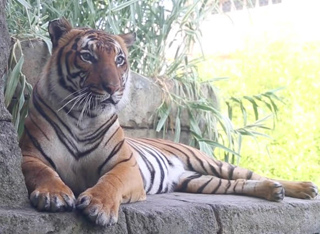Tiger

Screenshot from Zoo Knoxville video
Bashir is one of three Malayan tigers at Zoo Knoxville to test positive for COVID-19 in November. Dr. Joe Impellizeri, who is leading a just-approved trial for a COVID-19 vaccine candidate for cats, has said he hopes the research will help felines big and small as well as other animals and humans.
Amid the flurry of stories touting the first COVID-19 vaccines for humans comes news of a vaccine trial targeting SARS-CoV-2, the virus that causes COVID-19, in cats.
Applied DNA Sciences, a biotechnology company in Stony Brook, New York, and EvviVax, a veterinary biotechnology company in Rome, announced on Monday that they have received approvals from the New York State Department of Agriculture and Markets and the U.S. Department of Agriculture for a clinical trial of a vaccine candidate in domestic felines.
Applied DNA and EvviVax said they are targeting cats, in part, to mitigate a potential reservoir for infections in humans. Scientists believe infected cats could transmit the virus to people; however, there is no documented case of such transmission happening to date. In the 40 or so cases of pet cats testing positive for SARS-CoV-2 worldwide, the majority are believed to have caught the virus from infected people. A few infected cats are believed to have transmitted the virus to other cats.
The companies said the trial is expected to begin within 90 days at Guardian Veterinary Specialists, a multi-specialty veterinary hospital in Brewster, New York, where Dr. Joseph Impellizeri is the supervising investigator.
Fifteen healthy pet cats, living at home during the trial, each will be given two doses of the vaccine, administered 30 days apart, according to an email from Brian Viscount, executive director of product management for Applied DNA Sciences. The cats will be tracked for up to six months to evaluate the vaccine's safety and assess their immune response, including the presence of neutralizing antibodies. This trial will not demonstrate whether the vaccine works against the virus.
Applied DNA and EvviVax said they are developing another trial that will expose a second group of vaccinated cats (not pets) to COVID-19-positive cats in a controlled setting to see if the vaccine is effective against the virus.
The companies say if the trials are successful, they will apply for a conditional license from USDA Animal Plant Health Inspection Service (APHIS), which would allow for commercial sales due to the pandemic.
Whether there would be any takers of a COVID-19 vaccine for cats is an open question, since cats don't appear to be getting sick from the virus in significant numbers.
The companies maintain there would be a market. "With about 96M cats living in households in the U.S. as of 2017 and COVID-19 infection rates increasing nationally today, we believe there is utility for a vaccine for SARS-CoV-2 for cats," Viscount said via email.
Impellizeri suggested zoos might want the vaccine. He pointed to the case of the Bronx Zoo, where a Malayan tiger was the first documented case in the United States of a non-human animal showing clinical signs and testing positive for the COVID-19 virus. Ultimately, five tigers and three lions tested positive. In addition, a puma at a Johannesburg zoo and three tigers at a Knoxville zoo tested positive in April and October, respectively.
"Imagine the larger feline collections around the world, and you say, 'I have something that's preventative,' " Impellizeri said. "That could be tremendous, considering their value."
Applied DNA President and CEO James A. Hayward said in this week's announcement that a feline vaccine is not the sole goal of the research. He said he expects that the trial will provide "valuable complementary data for potential human COVID-19 vaccine candidate trials and charting a possible development path to other animals, such as mink."
Mink are a source of concern, as SARS-CoV-2 has been found in mink on farms in Denmark, Greece, Italy, the Netherlands, Spain, Sweden and the United States. Animals have gotten sick and died from the virus. Farmworkers are considered the likely initial source of the infections, which spread among the mink and other farm animals, according to the U.S. Centers for Disease Control and Prevention.
"Currently, there is no evidence that animals play a significant role in the spread of SARS-CoV-2 to people," the CDC said in a statement updated on Nov. 18. "However, reports from infected mink farms in the Netherlands and Denmark suggest that in these environments there is the possibility for spread of SARS-CoV-2 from mink to humans."
In Denmark, the world's largest producer of mink fur, the government ordered the culling of millions of mink to stop the spread of the virus, after mutated versions were found in the animals there. There are concerns that mutations could undermine the effectiveness of future vaccines for humans.
Correction: This story has been revised to correct a quote from Dr. Impellizeri.